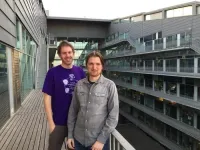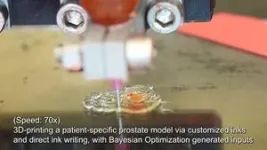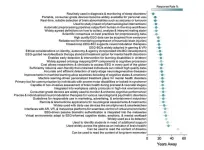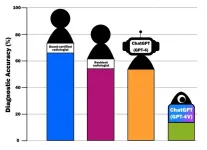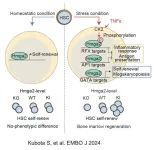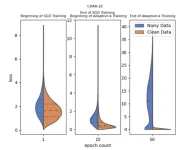(Press-News.org) A computational model built by researchers at the Institute of Research in Biomedicine (IRB Barcelona) and the Centre for Genomic Regulation (CRG) can predict which drugs will be most effective in treating diseases caused by mutations that can bring protein synthesis to a halt, resulting in unfinished proteins.
The findings, published today in Nature Genetics, mark an important step in helping personalise treatment by matching patients with specific mutations with the most promising drug candidate. The predictive model, a publicly available resource called RTDetective, can accelerate the design, development, and efficacy of clinical trials for many different types of genetic disorders and cancers.
Truncated proteins are the result of protein synthesis coming to a sudden halt. In our bodies, this is caused by the appearance of ‘nonsense mutations’ which act like a stop sign or roadblock, causing cellular machinery to suddenly hit the brakes. In many cases, these unfinished proteins stop working and cause disease.
The presence of these stop signs underlies up to one in five single-gene disorders, including some types of cystic fibrosis and Duchenne muscular dystrophy. They also often appear in tumour suppressor genes, which normally help control cell growth. Stop signs inactivate these genes and are a major cause of cancer.
Diseases emerging from truncated proteins can be targeted with nonsense suppression therapies, drugs which help cells ignore or "read through" the stop signs that appear during protein production. Cells with higher readthrough rates will make more full-length, or near full-length, proteins.
The study demonstrates that, to date, clinical trials of nonsense suppression therapies are likely to have used ineffective patient-drug combinations. This is because the effectiveness of drugs in promoting readthrough depends not just on the nonsense mutation, but also on the genetic code immediately surrounding it.
The researchers made the discovery after studying 5,800 disease-causing premature stop signs and testing the efficacy of eight different drugs on each of them. The data is derived from patient reports submitted to freely accessible public archives like ClinVar, as well as from research projects like The Cancer Genome Atlas (TCGA), which collected and analysed genetic information from thousands of cancer and genetic disease patients, including premature stop codons.
They found that a drug that works well for one premature stop sign may not be effective for another, even within the same gene, because of the local sequence context around the premature stop sign. “Think of DNA sequence as a road, with a stop mutation appearing as a roadblock. We show that navigating through this obstacle depends heavily on the immediate surroundings. Some mutations are surrounded by well-marked detour routes while others are full of potholes or dead ends. This is what marks a drug's ability to bypass obstacles and work effectively,” explains Ignasi Toledano, first author of the study and joint PhD student at IRB Barcelona and the Centre for Genomic Regulation.
The researchers generated a substantial amount of data by testing many different combinations of drugs on bypassing the stop signs, resulting in a total of over 140,000 individual measurements. The data was large enough to train accurate predictive models, which they used to create RTDetective.
The researchers used the algorithm to predict the effectiveness of different drugs for every one of the 32.7 million possible stop signs that can be generated in RNA transcripts in the human genome. At least one of the six drugs tested was predicted to achieve more than 1% readthrough in 87.3% of all possible stop signs, and 2% readthrough for nearly 40% of cases.
The results are promising because higher readthrough percentages generally correlate with better therapeutic outcomes. For example, Hurler syndrome is a severe genetic disorder caused by a nonsense mutation in the IDUA gene. Previous studies have shown that, with just 0.5% readthrough, individuals can partially mitigate the severity of the disease by creating very small amounts of functional protein. RTDetective predicted that readthrough above this threshold can be achieved by at least one of the drugs.
“Imagine a patient is diagnosed with a genetic disorder. The exact mutation is identified through genetic testing and then a computer model suggests which drug is the best to use. This informed decision-making is the promise of personalised medicine we hope to unlock in the future,” explains ICREA Research Professor Ben Lehner, one of the main authors of the study and Group Leader at the Centre for Genomic Regulation in Barcelona and the Wellcome Sanger Institute in the UK.
The study also suggests how new drugs can be quickly given to the correct patients. “When a new readthrough drug is discovered, we can use this approach to rapidly build a model for it and to identify all the patients that are most likely to benefit,” adds Professor Lehner.
The researchers next plan on confirming the functionality of proteins produced via readthrough drugs, a crucial step in validating their clinical applicability. The team also plans to explore other strategies that can be used in combination with nonsense suppression therapies to further the effectiveness of treatments, particularly in cancer.
"Our study not only opens new avenues for treatment of heritable genetic diseases, for which readthrough agents were trialled before, but also importantly for treatment of tumours, since the majority of cancers have mutations causing premature termination of proteins," concludes ICREA Research Professor Fran Supek at IRB Barcelona, one of the main authors of the study.
END
Detective algorithm predicts best drugs for genetic disorders and cancer
New tool can accelerate the design of clinical trials for diseases
2024-08-22
ELSE PRESS RELEASES FROM THIS DATE:
For first time, DNA tech offers both data storage and computing functions
2024-08-22
Researchers from North Carolina State University and Johns Hopkins University have demonstrated a technology capable of a suite of data storage and computing functions – repeatedly storing, retrieving, computing, erasing or rewriting data – that uses DNA rather than conventional electronics. Previous DNA data storage and computing technologies could complete some but not all of these tasks.
“In conventional computing technologies, we take for granted that the ways data are stored and the way data are processed are compatible with each other,” ...
Will EEG be able to read your dreams? The future of the brain activity measure as it marks 100 years
2024-08-22
One hundred years after the human brain’s electrical activity was first recorded, experts are celebrating the legacy of its discovery and sharing their predictions and priorities for its future.
Since the first recording in July 1924, human electroencephalography (EEG) has been integral to our understanding of brain function and dysfunction: most significantly in the clinical diagnosis of epilepsy, where the analysis of the EEG signal meant that a condition previously seen as a personality disorder was quickly redefined as a disorder of brain activity.
Now, a century on, more than 500 experts from around the globe, ...
Investigating the role of interhemispheric pathways in motor recovery
2024-08-22
Stroke and spinal cord injuries can severely impair motor functions, and understanding how to promote recovery is a critical challenge. While damaged neurons in the brain and spinal cord have limited ability to regenerate, the brain can form or strengthen alternative neural pathways involving uninjured parts of the brain, enabling functional recovery. Such reorganization of pathways in the brain is called neural plasticity, and identifying the involved pathways and understanding their functions can ...
Clinical trial in Ireland challenges beliefs about Ozempic and similar new obesity treatments
2024-08-22
A study carried out in St Vincent’s University Hospital (SVUH) Dublin challenges the belief that weight loss medications such as Ozempic, Wegovy or Monjaro work just by promoting satiety and making you eat less.
The randomized controlled trial with 30 patients was led by Professor Donal O’Shea, SVUH and UCD School of Medicine, and examined the family of medications based on the hormone Glucagon-like peptide-1 (GLP-1).
The findings published today in the Journal of the Obesity Society shows that there is a strong relationship between the increase in metabolic ...
Mouse study: Proteins do the damage in fetal abdominal inflammation
2024-08-22
Inflammation of the abdominal cavity in human fetuses resulting from a perforation of their intestine is likely to be caused by proteins contained in the fetal stool. This is the result of a Kobe University study that establishes a new mouse model allowing research and drug development for a condition that is otherwise difficult to approach.
The fetus’s stool, called the “meconium,” is sterile but nevertheless causes inflammation of the abdominal cavity when it leaks out of the intestine after a perforation. Called “meconium peritonitis,” this is a life-threatening condition for the baby with a mortality rate of 10%-15% in humans, and neither a cause ...
Let me take a look: AI could boost diagnostic imaging results
2024-08-22
In radiology, diagnostic imaging requires specialized knowledge to interpret the findings associated with a wide variety of diseases. Fortunately, in recent years, generative AI models, such as Chat Generative Pre-trained Transformer (ChatGPT), have shown potential as diagnostic tools in the medical field, but their accuracy must be evaluated for optimal use in the future.
Therefore, Dr. Daisuke Horiuchi and Associate Professor Daiju Ueda of Osaka Metropolitan University’s Graduate School of Medicine led a research team that compared the diagnostic accuracy of ChatGPT and radiologists. They used 106 musculoskeletal radiology cases with patient medical history, images, ...
Prof Carl Kocher explores how you can stretch your mind to grasp quantum entanglement
2024-08-22
My new article, ‘Quantum Entanglement of Optical Photons: The First Experiment, 1964-67’, is intended to convey the spirit of a small research project that reaches into uncharted territory. The article breaks with tradition, as it offers a first-person account of the strategy and challenges for the experiment, as well as an interpretation of the final result and its significance. In this guest editorial, I will introduce the subject and also attempt to illuminate the question ‘What is a paradox?’
Let’s begin with the gyroscope that I bought when I was eight, from a store ...
Unveiling the secret of blood regeneration: New insights into stress responses in hematopoietic stem cells (HSC)
2024-08-22
Kumamoto University researchers have made a groundbreaking discovery that sheds light on how the HMGA2 gene—an essential transcriptional activator involved in chromatin modification—regulates stress responses in hematopoietic stem cells (HSCs), thereby enhancing blood cell production recovery.
Exposure to infections or treatments such as chemotherapy often leads to a rapid decline in blood cells, including red blood cells and platelets. HSCs, which reside in the bone marrow that can develop into various types of blood cells, are crucial for recovering from these stress-induced blood disorders. Under stressd ...
MCG physicians working to help prevent vision loss associated with space travel
2024-08-22
Physicians at the Medical College of Georgia at Augusta University are working with Polaris Dawn, the first of the Polaris Program’s three human spaceflight missions, to better understand the eye changes many astronauts experience during spaceflight that can leave them with a wide range of symptoms once they return to Earth — from a new need for glasses to significant loss of vision. The Polaris Program is a first-of-its-kind effort to rapidly advance human spaceflight capabilities while continuing to raise funds and awareness for important causes on Earth.
More than 70% of astronauts experience a phenomenon ...
Adaptive-k: A simple and effective method for robust training in label noisy datasets
2024-08-22
Training deep learning models on large datasets is essential for their success; however, these datasets often contain label noise, which can significantly decrease the classification performance on test datasets. To address this issue, a research team consisting of Enes Dedeoglu, H. Toprak Kesgin, and Prof. Dr. M. Fatih Amasyali from Yildiz Technical University developed a groundbreaking method called Adaptive-k, which improves the optimization process and yields better results in the presence of label noise. Their research was published on 15 August 2024 in ...
LAST 30 PRESS RELEASES:
When safety starts with a text message
CSIC develops an antibody that protects immune system cells in vitro from a dangerous hospital-acquired bacterium
New study challenges assumptions behind Africa’s Green Revolution efforts and calls for farmer-centered development models
Immune cells link lactation to long-lasting health
Evolution: Ancient mosquitoes developed a taste for early hominins
Pickleball players’ reported use of protective eyewear
Changes in organ donation after circulatory death in the US
Fertility preservation in people with cancer
A universal 'instruction manual' helps immune cells protect our organs
Fifteen-year results from SWOG S0016 trial suggest follicular lymphoma is curable
The breasts of a breastfeeding mother may protect a newborn from the cold – researchers offer a new perspective on breast evolution
More organ donations now come from people who die after their heart stops beating
How stepping into nature affects the brain
Study: Cancer’s clues in the bloodstream reveal the role androgen receptor alterations play in metastatic prostate cancer
FAU Harbor Branch awarded $900,000 for Gulf of America sea-level research
Terminal ileum intubation and biopsy in routine colonoscopy practice
Researchers find important clue to healthy heartbeats
Characteristic genomic and clinicopathologic landscape of DNA polymerase epsilon mutant colorectal adenocarcinomas
Start school later, sleep longer, learn better
Many nations underestimate greenhouse emissions from wastewater systems, but the lapse is fixable
The Lancet: New weight loss pill leads to greater blood sugar control and weight loss for people with diabetes than current oral GLP-1, phase 3 trial finds
Pediatric investigation study highlights two-way association between teen fitness and confidence
Researchers develop cognitive tool kit enabling early Alzheimer's detection in Mandarin Chinese
New book captures hidden toll of immigration enforcement on families
New record: Laser cuts bone deeper than before
Heart attack deaths rose between 2011 and 2022 among adults younger than age 55
Will melting glaciers slow climate change? A prevailing theory is on shaky ground
New treatment may dramatically improve survival for those with deadly brain cancer
Here we grow: chondrocytes’ behavior reveals novel targets for bone growth disorders
Leaping puddles create new rules for water physics
[Press-News.org] Detective algorithm predicts best drugs for genetic disorders and cancerNew tool can accelerate the design of clinical trials for diseases
